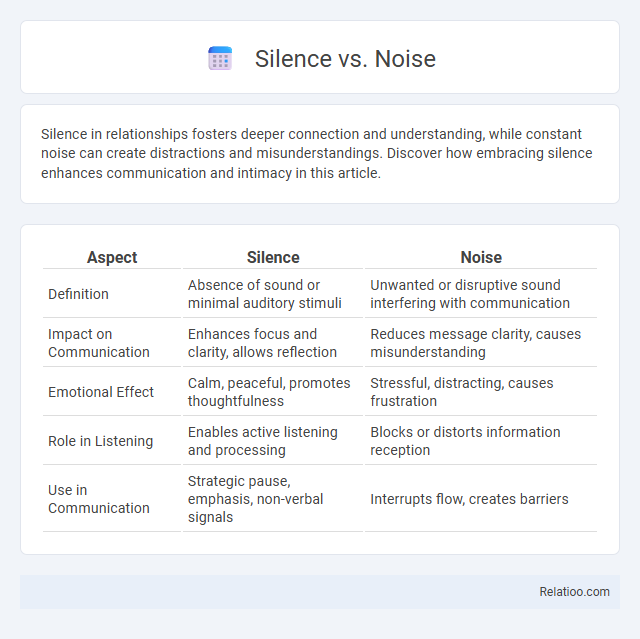Silence in relationships fosters deeper connection and understanding, while constant noise can create distractions and misunderstandings. Discover how embracing silence enhances communication and intimacy in this article.
Table of Comparison
| Aspect | Silence | Noise |
|---|---|---|
| Definition | Absence of sound or minimal auditory stimuli | Unwanted or disruptive sound interfering with communication |
| Impact on Communication | Enhances focus and clarity, allows reflection | Reduces message clarity, causes misunderstanding |
| Emotional Effect | Calm, peaceful, promotes thoughtfulness | Stressful, distracting, causes frustration |
| Role in Listening | Enables active listening and processing | Blocks or distorts information reception |
| Use in Communication | Strategic pause, emphasis, non-verbal signals | Interrupts flow, creates barriers |
Understanding Silence and Noise
Silence is the complete absence of sound, creating an environment free from auditory stimuli that allows for mental clarity and focus. Noise consists of unwanted or disruptive sounds that interfere with communication, concentration, and overall well-being. Understanding the differences between silence and noise helps optimize spaces for productivity, relaxation, and effective communication by managing sound levels and minimizing auditory distractions.
The Psychology of Silence
The psychology of silence reveals its profound impact on mental well-being, fostering introspection, reducing stress, and enhancing cognitive function. Silence serves as a psychological reset, allowing the brain to process emotions and improve focus, contrasting sharply with noise, which often triggers anxiety and overstimulation. Understanding the balance between silence and noise is essential for optimizing mental health, promoting emotional regulation, and supporting creativity and productivity.
The Impact of Noise on Mental Health
Exposure to chronic noise pollution significantly elevates stress hormone levels, contributing to anxiety, depression, and impaired cognitive function. In contrast, silence or quiet environments promote relaxation, improve concentration, and support emotional well-being by reducing cortisol release and calming neural activity. Research from the World Health Organization links prolonged noise exposure to increased risks of cardiovascular diseases and mental health disorders, highlighting the critical need for noise control in urban planning and public health policies.
Silence in Communication
Silence in communication serves as a powerful tool that conveys meaning beyond words, often indicating contemplation, agreement, or emotional depth. Unlike noise, which disrupts or distracts, silence creates space for active listening and deeper understanding between parties. Your ability to interpret and embrace silence can enhance clarity and build stronger interpersonal connections.
Noise Pollution in Modern Society
Noise pollution in modern society significantly impairs health by increasing stress levels, disrupting sleep, and contributing to cardiovascular diseases. Urban environments are particularly affected due to constant exposure to traffic, industrial activities, and construction noise, which reduces overall well-being and productivity. Mitigating noise pollution requires implementing strict regulations on noise levels, promoting the use of soundproof materials, and creating silent zones to preserve essential moments of silence for mental and physical health.
Benefits of Embracing Silence
Embracing silence offers profound benefits by reducing stress, enhancing mental clarity, and improving focus, which noise often disrupts. Silence allows your brain to reset, promoting creativity, emotional balance, and deeper self-awareness. Prioritizing moments of quiet can significantly improve overall well-being and productivity in your daily life.
Silence in Creative Processes
Silence in creative processes enhances cognitive function by minimizing distractions and fostering deep focus, allowing innovative ideas to emerge more clearly. Studies indicate that environments with reduced noise levels improve problem-solving abilities and encourage imaginative thinking. Embracing silence creates a mental space where creativity thrives, supporting sustained attention and original concept development.
Strategies to Manage Noise
Effective strategies to manage noise involve using soundproofing materials like acoustic panels, heavy curtains, and double-glazed windows to reduce external and internal noise levels. Implementing white noise machines helps mask disruptive sounds, creating a calming environment ideal for focus and relaxation. Establishing quiet zones and scheduling allocated silent times further enhances concentration and productivity by minimizing auditory distractions.
Finding Balance: Silence and Noise
Finding balance between silence and noise is essential for maintaining mental clarity and emotional well-being. Excessive noise can cause stress and hinder concentration, while silence promotes relaxation and cognitive restoration. You can improve focus and reduce anxiety by intentionally incorporating quiet moments into your daily environment.
The Future of Sound in Human Life
The future of sound in human life hinges on balancing silence and noise to enhance mental well-being and cognitive function. Advanced noise-canceling technologies and soundscaping innovations are expected to create personalized acoustic environments that promote focus and relaxation. Integrating adaptive noise management systems in urban design will significantly improve quality of life by reducing harmful noise pollution while preserving beneficial auditory experiences.

Infographic: Silence vs Noise
 relatioo.com
relatioo.com